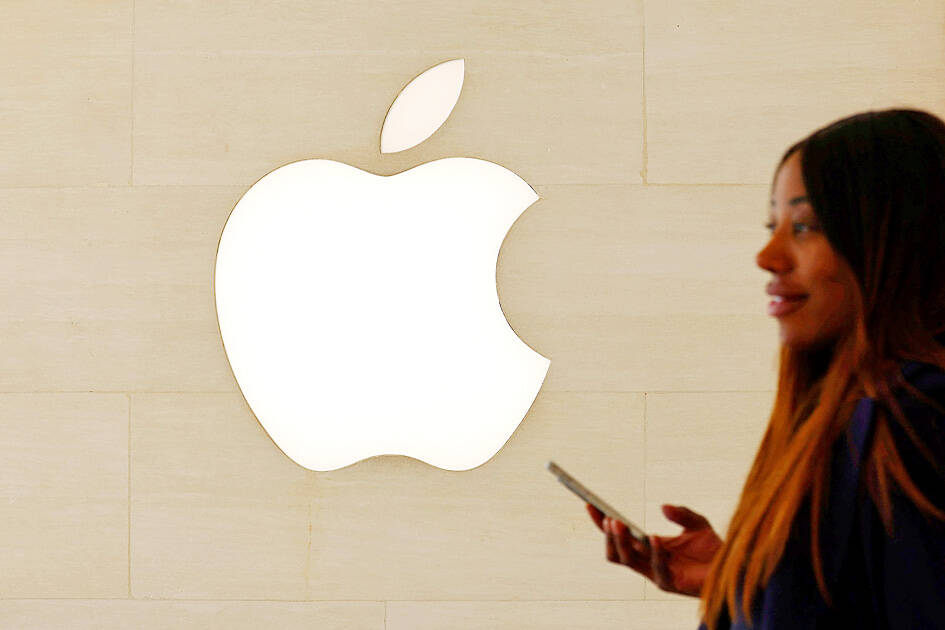Pressure is on Apple Inc to show it has not lost its magic despite broken promises to ramp up iPhones with generative artificial intelligence (GenAI) as rivals race ahead with the technology.
Apple is to showcase plans for its coveted devices and the software powering them at its annual Worldwide Developers Conference (WWDC), which starts today in Silicon Valley.
The event comes a year after the tech titan said a suite of AI features it dubbed “Apple Intelligence” was heading for iPhones, including an improvement of its much criticized Siri voice assistant.

Photo: Reuters
“Apple advertised a lot of features as if they were going to be available, and it just didn’t happen,” Emarketer senior analyst Gadjo Sevilla said.
Instead, Apple delayed the rollout of the Siri upgrade, with hopes that it would be available in time for the next iPhone release, expected in the fall.
“I don’t think there is going to be that much of a celebratory tone at WWDC,” Sevilla said. “It could be more of a way for Apple to recover some credibility by showing where they’re headed.”
Industry insiders would be watching to see whether Apple addresses the AI stumble or focuses on less splashy announcements, including a rumored overhaul of its operating systems for its line of devices.
“The bottom line is Apple seemed to underestimate the AI shift, then overpromised features, and is now racing to catch up,” Deepwater Asset Management LLC analysts Gene Munster and Brian Baker wrote in a note.
Rumors also include talk that Apple might add GenAI partnerships with Google or Perplexity to an OpenAI alliance announced a year ago.
Infusing its lineup with AI is only one of Apple’s challenges.
Developers, who build apps and tools to run on the company’s products, might be keen for Apple to loosen its tight control of access to iPhones.
“There’s still a lot of strife between Apple and developers,” Sevilla said. “Taking 30 percent commissions from them and then failing to deliver on promises for new functionality — that’s a double black eye.”
A lawsuit by **Fortnite** maker Epic Games Inc ended with Apple being ordered to allow outside payment systems to be used at the US App Store, but developers might want more, the analyst said.
“Apple does need to give an olive branch to the developer community, which has been long-suffering,” Sevilla said. “They can’t seem to thrive within the restrictive guardrails that Apple has been putting up for decades now.”
As AI is incorporated into Apple software, the company might need to give developers more ability to sync apps to the platform, Creative Strategies Inc analyst Carolina Milanesi said.
“Maybe with AI it’s the first time that Apple needs to rethink the open versus closed ecosystem,” Milanesi said.
While unlikely to come up at WWDC, Apple has to deal with tariffs imposed by US President Donald Trump in his trade dispute with China, a key market for sales growth, as well as the place where most iPhones are made.
Trump has also threatened to hit Apple with tariffs if iPhone production was not moved to the US, which analysts say is impossible given the costs and capabilities.
“The whole idea of having an American-made iPhone is a pipe dream; you’d have to rewrite the rules of global economics,” Sevilla said.

In Italy’s storied gold-making hubs, jewelers are reworking their designs to trim gold content as they race to blunt the effect of record prices and appeal to shoppers watching their budgets. Gold prices hit a record high on Thursday, surging near US$5,600 an ounce, more than double a year ago as geopolitical concerns and jitters over trade pushed investors toward the safe-haven asset. The rally is putting undue pressure on small artisans as they face mounting demands from customers, including international brands, to produce cheaper items, from signature pieces to wedding rings, according to interviews with four independent jewelers in Italy’s main

Japanese Prime Minister Sanae Takaichi has talked up the benefits of a weaker yen in a campaign speech, adopting a tone at odds with her finance ministry, which has refused to rule out any options to counter excessive foreign exchange volatility. Takaichi later softened her stance, saying she did not have a preference for the yen’s direction. “People say the weak yen is bad right now, but for export industries, it’s a major opportunity,” Takaichi said on Saturday at a rally for Liberal Democratic Party candidate Daishiro Yamagiwa in Kanagawa Prefecture ahead of a snap election on Sunday. “Whether it’s selling food or

CONCERNS: Tech companies investing in AI businesses that purchase their products have raised questions among investors that they are artificially propping up demand Nvidia Corp chief executive officer Jensen Huang (黃仁勳) on Saturday said that the company would be participating in OpenAI’s latest funding round, describing it as potentially “the largest investment we’ve ever made.” “We will invest a great deal of money,” Huang told reporters while visiting Taipei. “I believe in OpenAI. The work that they do is incredible. They’re one of the most consequential companies of our time.” Huang did not say exactly how much Nvidia might contribute, but described the investment as “huge.” “Let Sam announce how much he’s going to raise — it’s for him to decide,” Huang said, referring to OpenAI

The global server market is expected to grow 12.8 percent annually this year, with artificial intelligence (AI) servers projected to account for 16.5 percent, driven by continued investment in AI infrastructure by major cloud service providers (CSPs), market researcher TrendForce Corp (集邦科技) said yesterday. Global AI server shipments this year are expected to increase 28 percent year-on-year to more than 2.7 million units, driven by sustained demand from CSPs and government sovereign cloud projects, TrendForce analyst Frank Kung (龔明德) told the Taipei Times. Demand for GPU-based AI servers, including Nvidia Corp’s GB and Vera Rubin rack systems, is expected to remain high,